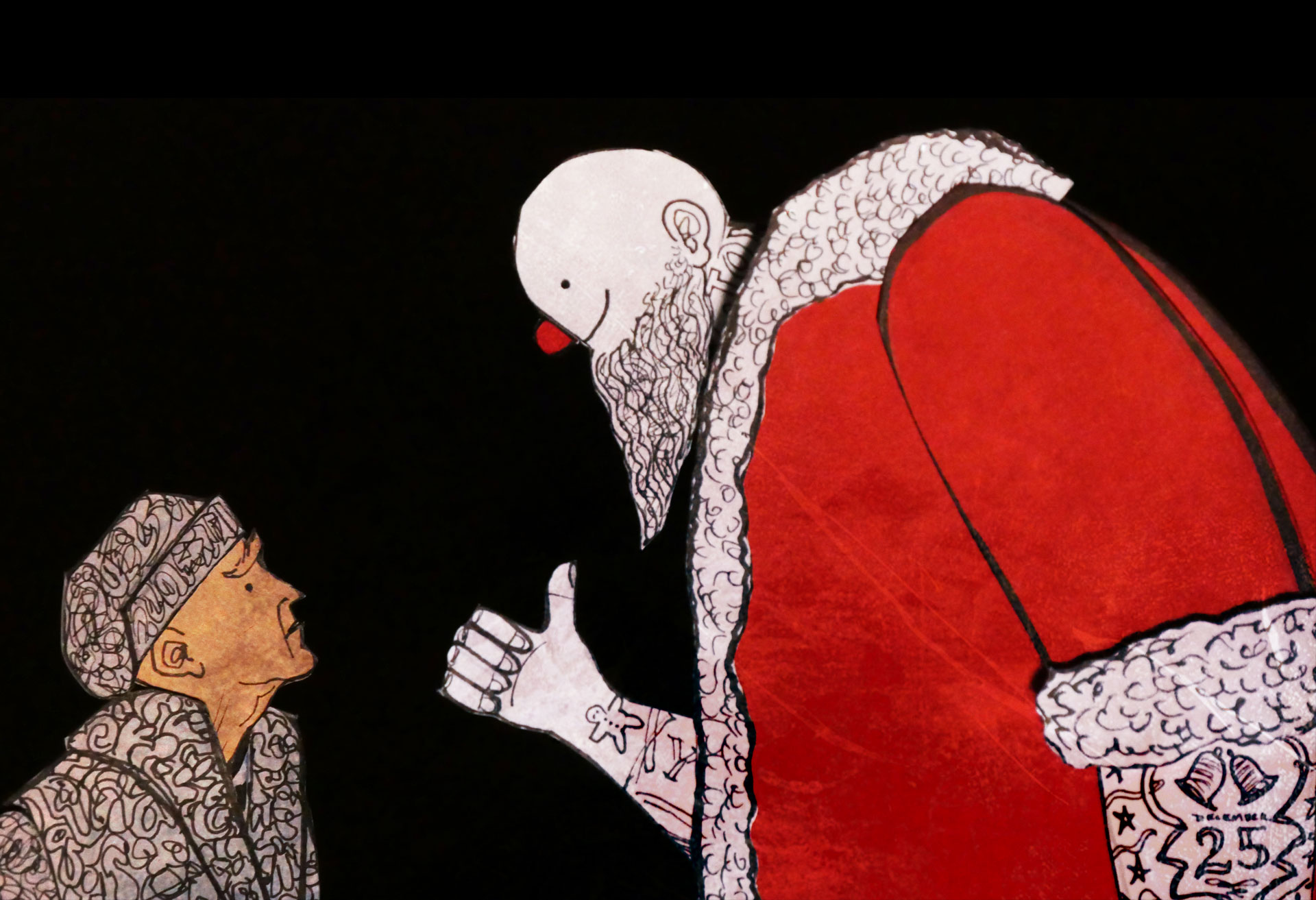
Inspired by Manual Cinema's Christmas Carol
A nostalgic street. Waifish drifts of snow landed on bodies milling about the shoppes. The Critic removed their flat cap as they entered The Hearth Coffee and Gallery, brushed the melty snowflakes off of its face. The warmly-lit cafe encircled their wet clothing quite immediately, and they ordered their regular rich, dark blend without stalling in inconvenience. They were not here for the coffee. The Hearth was a place of discourse, and The Critic had been tortured by ruminations in the weeks since the end of November. The Artist and The Enthusiast had expected their arrival, the latter of which caught the Critic’s attention with a waving hand.
“I had seen you already,” they said, despite having not done so.
“Well, it’s just a courtesy, in case you hadn’t, and all,” the Enthusiast said.
“Anyways, you had told us you had been thinking about something- what was it?” came the Artist’s interjection.
“It’s all a little vague, but the season has inspired me to consider a way out of the classics,” the Critic said.
“What do you mean by that?” the Artist asked, her voice now lax.
“It’s self-explanatory, really; a means of escaping the modern literary fixation with writers who died centuries before we were born," they said.
The enthusiast now piped in- “is the issue that they are so old?”
“Obviously not. The issue is their mythologization. No piece of literature can be great for two, even four centuries, simply as an object, and yet the classics are all taken as objects,"
“You can’t fault me for assuming that was your issue, it’s a common objection,” the Enthusiast said. The Critic rapped their shoe on the hardwood floor.
“Let them speak,” said the Artist.
“It just frustrates me. I want more people to value literature, but most see it as simply above them, and enable weaker work that appeals to their alienation from great fiction- if they read at all,"
“So, you believe that the classics prevent the average person from getting a taste for literature?” asked the Enthusiast.
“More or less, though my real issue isn’t with the text. It’s with a cultural attitude. People start hating classic literature because it is treated as timelessly valuable and inherently good, neither open to interpretation nor accessible from any perspective but the ‘intended’ one. This attitude towards classic literature has essentially invented the modern perception of Englishclasses,” said the Critic.
“Some people also just don’t enjoy some things,” said the Artist.
The Critic took a sip of their coffee and said “That’s irrelevant to my point. The issue is that this attitude prevents both a meaningful appreciation of modern literature and enables nostalgia. It’s contrary to the progress of the medium."
“What do you think we should do about that?” asked the Artist.
“That was my issue. I’m neither a politician, nor a sociologist. I don’t know with accuracy how ideas spread or how to spread ideas. However, that’s what I think must happen. A shift in paradigm. Educators are too slow to adapt, and obviously you can’t ban literary idolatry," said the Critic.
“And what about people who legitimately enjoy such works?” the Enthusiast had raised his voice.
“Again, I consider that appreciation irrelevant, or even part of the issue in itself, depending on how it’s expressed. I don’t think base enjoyment factors into this discussion,” said the Critic. They blew on their coffee, and took a sip.
“And why not? I see no reason that art should be considered as not having value just for its being pleasurable. Just because you consider something as irrelevant does not mean that it is for most people,” said the Artist.
“I question whether it’s healthy to consider the relationship between many people and the western canon purely aesthetic. This is a discussion of the cultural relations of classic literature, and we shouldn’t stray away from cultural critique for good feelings," said the Critic.
The Enthusiast cleared his throat. “Conversely, we shouldn’t stray away from acknowledging the value of comfort and genuine appreciation for the sake of pushing cultural critique that encourages bad feelings. It comes at the cost of your analysis."
“Individual out cases aren’t pertinent here. This discussion was never about that,” said the Critic. They shifted in their seat, and took a long draft of coffee.
The Artist placed her hand before her, palm up. “I think you’re discounting the amount of people who would take umbrage with what you’re proposing, and that that would degrade the quality of literature, instead of refining it.”
“I agree- diversity is the strength of any medium. Just because a poor painter exists, that does not mean that great painters cannot come out of the woodwork. If anything, a greater breadth of subjects and methods would only aid the exceptional artists.” said the Enthusiast.
“It just frustrates me knowing that people accept the bare minimum. That I have spent so much time around these people who cling to their antiquated objects and purposeless, nostalgic, meandering texts, and that it’s justified at every turn,” the Critic said.
“Hey, now- I just wanted to offer a bit of critique,” said the Enthusiast, but before he could finish his next thought, the Critic responded.
“But you’re...” they took a sip of coffee, only to find that there was none left in the mug. “You’re preventing critique in critique! You’re defending a society filled with falsehood! Do you want to defend the stagnation of literary culture?”
“No, I mean, by some definitions maybe- I just want to make sure you acknowledge the value of literature in diverse ways,” the Enthusiast said.
“I just wanted to outline my ruminations...” said the Critic, hoarsely.
“You were allowed to do so- is there a reason why you’re so upset?” asked the artist.
“I just want to carry on with my thoughts,” said the Critic. “Let me step out a moment.”
“Do what you must,” said the Artist, staring at the ceiling.
The Critic walked out of the cafe. It was still snowing, and more heavily than before. They pressed their coat to their chest and went on their way, mustering a smile at the blinking lights and the children staining glass with their breath, noses pressed to store windows. A few smiled back, bright and sincere.


